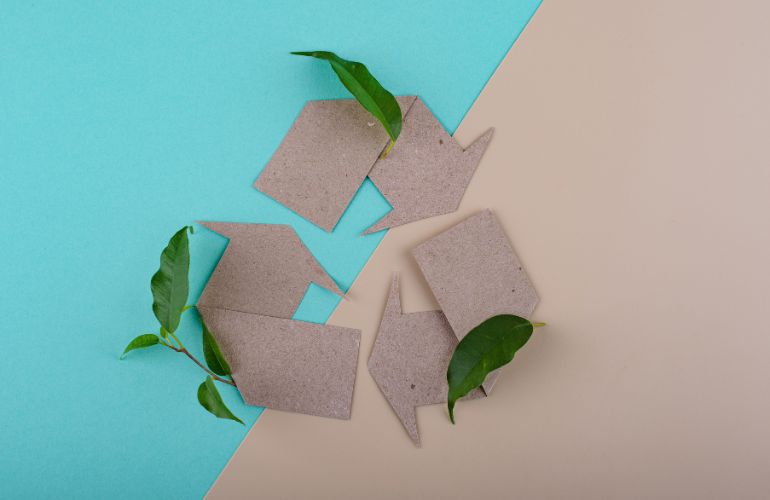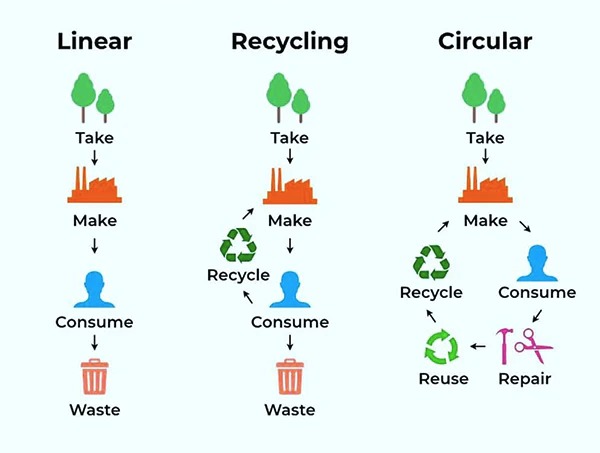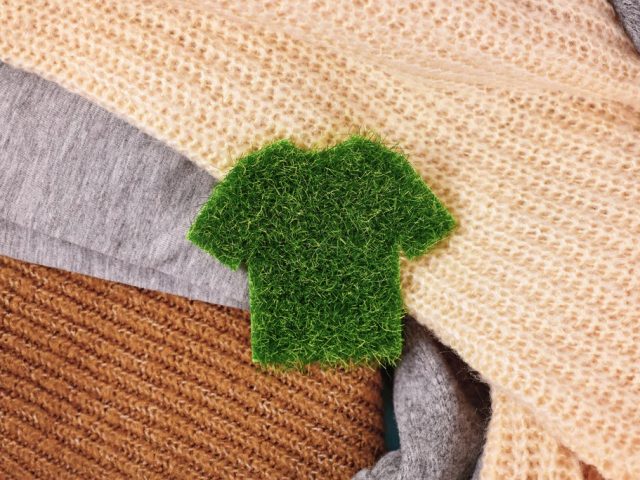
The European Environment Agency (EEA) has published a briefing on the destruction of returned and unsold textiles
March 4, 2024
The European Environment Agency (EEA) today published a briefing on the destruction of returned and unsold textiles in Europe's circular economy. You can access the briefing here
https://www.eea.europa.eu/publications/the-destruction-of-returned-and/
and the main messages below:
Based on available studies, it is estimated that 4-9% of all textile products put on the market in Europe are destroyed before use, which means between 264,000 and 594,000 tons of textiles are destroyed each year. In Europe, the average return rate for clothes bought online is estimated at 20% - one in every five clothes sold online is returned. The return rate for products sold online is up to three times higher than for products sold in physical stores. AEM estimates that 22-43%, or on average a third of all returned clothes bought online end up in the trash. Less information is available on the volumes and shares of textile products that remain unsold. The average share of unsold textile products found in the literature is 21%, some of which are returned clothes. It has been estimated that about a fifth of the 21% unsold stock ends up being destroyed.
Returned and unsold textiles are challenging and costly for the industry to manage. Most are resold or sold in outlets. However, the destruction of returned and unsold clothing and other textile products has been going on for decades in the fashion and textile industry, with significant negative effects on the environment and climate change.
With the recent EU policy decision to introduce an outright ban on the destruction of textiles and footwear, means must be found to sell all products and avoid the destruction of returned and unsold textiles.
EuRIC submits recommendations on the targeted revision of the Waste Framework Directive (WFD)
October 17, 2023
The Waste Framework Directive is a key piece of legislation guiding the waste management operator in the EU Member States. As the EU seeks to continuously improve its environmental policies, the European Confederation of Recycling Industries (EuRIC) welcomes efforts to partially revise this directive to address current challenges. EuRIC Textiles, EuRIC's subsidiary dedicated to textile re-use and recycling, welcomes the focus on textile waste.
While EuRIC Textiles supports the overall objective of the revision, we have identified a few critical points that require careful consideration to ensure the effectiveness of the Directive. In this context, the European Parliament's initiative to extend the partial revision by incorporating provisions on illegal landfills and defining the use of inert waste in cement as recycling is unclear.
New product priorities Ecodesign for sustainable products
May 16, 2023
A review of the draft study published by the Joint Research Center (JRC)
The European recycling industry strongly welcomes the European Commission's (EU COM) focus on sustainable production - for a wide range of products - through the recently published proposal for a Regulation on sustainable product eco-coding [COM(2022) 142]. This shows the EU Commission's commitment to setting ambitious measures to stimulate the circularity of different intermediate and end-use product groups prioritized proposal. This is now more important than ever, especially as only around 12% of material resources come from recycled materials (EUROSTAT). This is a testimony that the European economy remains largely linear and that there are significant room for improvement (JRC, 2023).
This paper is divided into different streams and aims to outline the position of the European recycling industry on the ESPR proposal and is intended as a response to the EC's open public consultation. EuRIC looks forward to working closely with the EU COM and legislators to ensure the introduction of harmonized rules on the different intermediate and end-use product groups that promote the Union's circular economy objectives . The recycling industry stands ready to assist in the development of delegated acts and implementing provisions.
Handling and sorting specifications - For reuse and recycling of used textiles
September 6, 2021
Textiles and clothing are essential to our daily lives. In the last two decades, clothing consumption has more than doubled, leading to a drastic increase in discarded textiles. The EU-wide obligation to separately collect textiles by 2025 will further increase the supply of used textiles, footwear and accessories. Proper handling and sorting is essential to ensure optimal reuse and recycling of used textiles.
The newly published "EuRIC EuRIC Textile Handling and Sorting Specifications for Reuse and Recycling of Used Textiles" are recommended as a guide throughout the collection and sorting process to prepare items for reuse or recycling in accordance with the industry's waste hierarchy and best practices. They are intended to be used by industry professionals along the textile value chain in their day-to-day operations, as the processes described ensure high quality second-hand textiles for reuse and/or adequate supply for the subsequent recycling process. .
"At EuRIC Textiles, we believe it is important to have uniform and clear specifications describing how used textiles should be handled in order to achieve the highest possible percentage of reuse and recycling," said explained Mariska Zandvliet, President of EuRIC Textiles. "With the expected increase in waste textiles to be collected after 2025, minimizing quality losses during the sorting process and maximizing reuse and recycling opportunities must remain our top priority. Our specifications, prepared by leading industry professionals, ensure that the quality of collected textiles is preserved and describe a sorting process for sustainable reuse and recycling. Thus, serving as a trusted source for the entire industry facilitating circularity in textiles" , a concluzionat ea.
European recyclers' position on chemical recycling and key elements to fuel the EU circular economy
September 21, 2023
Against the backdrop of ongoing discussions in Brussels, EuRIC, the leading association of materials recyclers addresses key questions for emerging technologies to complement existing recycling practices. We offer suggestions for policy makers and chemical recycling advocates to convey a transparent message on achieving circularity for plastics, textiles and tires.
EuRIC position updated on EPR textile schemes
February 2, 2021
In 2020, the volume of textiles separately collected in the EU-27 has been estimated to be between 1.6 and 2.5 million tons (MT). What is currently a self-financing system through revenues generated by preparing for re-use and marketing second-hand textiles [1] will change drastically in the future. For example, 87% of German collectors reported an average decrease in quality due to the increased presence of impurities or lower quality of the textiles they receive [2] . There is therefore a strong need to encourage the development of new markets for used textiles, but also for recycled fibers. One of the policy instruments to strengthen the market for re-use and recycling of textiles is an Extended Producer Responsibility (EPR) scheme, introduced by the Directive- Waste Framework Directive 2008/98/EC (Extended Producer Responsibility Schemes are a set of measures taken by Member States to ensure that textile producers would have financial responsibility for the management of the waste phase of the textile life cycle.
[1] GftZ: Hintergründe und Strategien zum Aufbau eines Systems für eine „Erweiterte Produzentenverantwortung für Textilien” (2019)
[2] Bvse Textilstudie (2020)
Poziția EuRIC pentru o revizuire a Regulamentului privind transportul deșeurilor care sprijină economia circulară
09 decembrie 2020
Regulamentul privind transportul deșeurilor (WSR) este, așa cum s-a identificat pe bună dreptate în noul CEAP, un act legislativ esențial, cu prevederi care trebuie aliniate la obiectivele generale ale tranziției către o economie circulară. Prin urmare, revizuirea oferă oportunitatea de a face atât ajustările necesare pentru a remedia blocajele de durată, cât și schimbări radicale pentru a aborda obstacolele pe termen lung înrădăcinate în obligații învechite.
Este timpul să aliniem procedurile stabilite de Expedierea deșeurilor cu ritmul lanțurilor valorice circulare. O schimbare de paradigmă necesită tratarea deșeurilor în legislație ca o resursă care permite economia circulară, a subliniat Peter FLORMANN, președintele EuRIC Waste Shipment Task Force.
Această lucrare depășește simpla identificare a problemelor de durată înrădăcinate în procedurile de expediere a deșeurilor. Acesta oferă soluții detaliate pentru a sprijini o revizuire a WSR care permite crearea unei piețe europene funcționale pentru materii prime secundare. EuRIC solicită în special
- Proceduri simplificate de expediere a deșeurilor, fie că este vorba de deșeuri pe lista verde și deșeuri supuse procedurii de consimțământ prealabil informat (PIC), care utilizează pe scară largă digitalizarea (proceduri electronice);
- Păstrarea comerțului liber și echitabil cu materii prime secundare, care este vital pentru competitivitatea industriei europene de reciclare și pentru accelerarea tranziției către o economie circulară, echitând în același timp condițiile de concurență cu materii prime primare;
- Însoțirea revizuirii regulamentului privind transportul deșeurilor de cerințe obligatorii pentru a stimula utilizarea materiilor prime secundare în procesele de producție și a recompensa beneficiile lor de mediu bine documentate în ceea ce privește economiile de GES și energie.
Pentru Julia BLEES, Senior Policy Officer la EuRIC, închiderea granițelor nu a adus niciodată niciun beneficiu, cu excepția distorsionării piețelor. Deși EuRIC sprijină în totalitate evitarea deșeurilor neprelucrate care prezintă un risc pentru mediu pentru a-și găsi drumul către țările care nu au infrastructură și face propuneri practice în acest sens, este esențial să se asigure că comerțul liber și echitabil cu materii prime secundare rămâne nestingherit. Într-o perioadă în care industria europeană rămâne în cea mai mare parte liniară, cu doar 12% din materialele pe care le folosește provenind din reciclare [1] , stimularea cu adevărat a lanțurilor valorice circulare în Europa necesită măsuri decisive, cum ar fi obiective obligatorii de conținut reciclat și stimulente care sprijină adoptarea materialelor reciclate în producție, nu bariere comerciale, a concluzionat ea.

